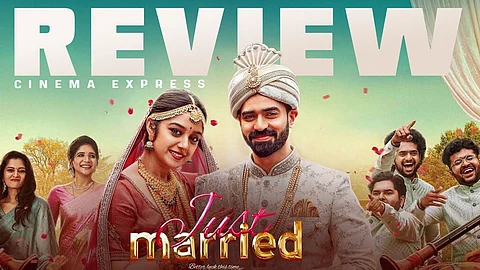Just Married Movie Review: A bittersweet tale of the cracks beneath picture-perfect families
Just Married(2.5 / 5)
Just Married Movie Review:
Every big Indian family drama comes wrapped in the same satin gift paper: rituals, laughter, a courtyard filled with gossiping relatives, and a camera that refuses to leave the wedding canopy. Just Married, directed by Bobby CR in her debut outing, begins in exactly that space. Surya meets Sahana, vows are exchanged, and the frames glitter with awnings, songs, and a white-vanilla brightness that feels ceremonial. Bobby, who carries years of music experience, collaborates with Ajaneesh Loknath, who is also the co-producer, to stage a wedding that feels both lived-in and yet cinematic. But if you’ve attended enough weddings, you know that beneath the satin and sugar, families carry dark shadows. With Just Married, where two couples stand at the edge of hope, Bobby seems intent on reminding us that even the most venerable lineages cannot escape the weight of their past.
Director: CR Bobby
Cast: Shine Shetty, Ankita Amar, Devaraj, Anup Bhandari, Sakshi Agarwal, and Sriman
Surya (Shine Shetty), heir to a 250-year-old household, is the face of this contradiction. Like many heirs, he inherits more than land and rituals. He inherits a curse: the men in his family—respected, admired, feared—are undone by their weakness for women. Sahana (Ankita Amar) knows this history even before she steps into the marriage. She marries not in ignorance but with conditions, and eyes wide open. Bobby reminds us of a hard truth: knowing the pain doesn’t make it hurt less—sometimes it hurts even more. Can Surya fight his fate, or will he end up just another name in his family’s story of betrayal?
The film is thick with symbols. Grandfather Poornachandra (Devaraj), a retired judge, paces the corridors of an old-age home, nostalgia clutched like a lantern when he sees a traditional lamp lit. This ancestral house hides a locked cupboard of children’s toys, like a museum of guilt. Anand (Anup Bhandari) and Jyothi (Sakshi Agarwal) bring in shades of mystery, while Sishupala (Sriman), despite political ambitions, finds himself entangled in a problem. Not to forget Surya, haunted by hallucinations. At times, you wonder if you are watching a psychological fable of fractured individuals. Perhaps that’s deliberate. Bobby isn’t content with the sugar rush of rituals—she wants to leave us with the bitter aftertaste too.
Shine Shetty, in his first outing as lead, gives Surya a lived-in unpredictability. He’s not saintly nor wholly damned. His tenderness with his grandfather sits uneasily beside his rage when provoked. His scenes with Devaraj are alive—affection and authority flow both ways. With Ankita Amar’s Sahana, he shares smaller but warmer battles: playful spats, guarded affection, silent negotiations. Ankita doesn’t play the stereotypical wronged wife. She is steady, aware, sometimes vulnerable, always composed. That steadiness anchors the film.
The ensemble adds flavour, though sometimes too much. Shruthi Hariharan as Anjali appears late but changes the emotional temperature with the ache of forgotten love. Shruti as Gangamma delivers a twist, while Malavika surfaces in a flashback. Abhishek Das becomes a pivot, while Achyuth Kumar and Ashok drag the narrative into political territory. Anup Bhandari—a director testing his acting skills—plays a role of real consequence. Around them swirl familiar presences: Ravi Shankar Gowda as Vinay Prakash, Vani Harikrishna as Mangala, Sangeetha Anil as Girija. This large gathering adds breadth, if not always depth.
But cracks emerge. Bobby wants the film to do too much: marriage, politics, hallucinations, love, betrayal, divorce, spectacle, and of course, conditions. The first half drifts in a haze of festivities until the arrival of a child snaps the story into shape. The second half breathes better, connecting the dots, balancing fragility and forgiveness. The baby doesn’t erase scars, but it gestures toward healing. The film also insists that love from the past never disappears—it lingers, sometimes haunts. The spectacle, though, outpaces plausibility: a family so exalted that its members are felicitated by the Chief Minister tips the narrative from realism into staged entertainment.
By the end, Just Married is not the glossy wedding album it pretends to be. It’s closer to a cracked mirror—reflective but with fissures across the surface. While Bobby doesn’t deliver a flawless debut, she delivers a searching one. She nudges us to see marriages not as fairy-tale unions but as fragile negotiations between memory, mistakes, and forgiveness.
Not flawless, not formula. Just Married sits in that uneasy but truthful space between celebration and confession—between conditions and freedom. In the end, it isn’t a glossy wedding album, but a showcase of the relationship cracks that make families human.

